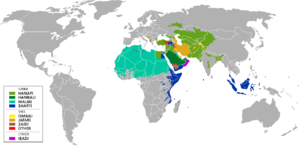- Madh'hab
-
Part of a series on Islam
Usul al-fiqh
(The Roots of Jurisprudence)Fiqh - Quran and Sunnah
- Taqlid (imitation)
- Ijtihad (interpretation)
- Ijma (consensus)
- Madh'hab (school of law)
- Minhaj (method)
- Qiyas (analogical reasoning)
- Urf (society custom)
- Bid‘ah (innovation)
- Madrasah (school/seminary)
- Ijazah (authorization)
- Istihlal (legalization)
- Istihsan (discretion)
- Risalah (dissertation)
Ahkam Scholarly titles - Mujtahid (scholar of Islamic law with comprehensive understanding of the texts and reality)
- Marja (authority)
- Alim (scholar; pl. Ulema)
- Mufti (cleric)
- Mufassir (interpreter)
- Qadi (judge)
- Faqīh (professional counselor/jurist)
- Muhaddith (narrator)
- Mullah (scholar; pl. Ulema)
- Imam (Sunni and Shia)
- Mawlawi (scholar; pl. Ulema)
- Sheikh (elderly person, respected person, also sometimes scholar; pl. Ulema)
- Mujaddid (renewer)
- Hafiz
- Hujja
- Hakim
- Amir al-Mu'minin in reg. hadith
- Maulana (scholar; pl. Ulema)
Madhhab (Arabic: مذهب maḏhab, IPA: [ˈmæðhæb], "doctrine"; pl. مذاهب maḏāhib, [mæˈðæːhɪb]; transliterated Urdu: mazhab or mezheb) is a Muslim school of law or fiqh (religious jurisprudence). In the first 150 years of Islam, there were many such "schools". In fact, several of the Sahābah, or contemporary "companions" of Muhammad, are credited with founding their own. The prominent Islamic jurisprudence schools of Damascus in Syria (often named Awza'iyya), Kufa and Basra in Iraq, and Medina in Arabia survived as the Maliki madhhab, while the other Iraqi schools were consolidated into the Hanafi madhhab. The Shafi'i, Hanbali, Zahiri and Jariri schools were established later, though the latter school eventually died out.
Contents
Established schools
The four mainstream schools of Sunni jurisprudence today, named after their founders (sometimes called the A’immah Arba‘a or four Imaams of Fiqh[1]), are not generally seen as distinct sects, as there has been harmony for the most part among their various scholars throughout Islamic history.
Generally, Sunni Muslims prefer one madhhab out of the four (normally a regional preference) but also believe that ijtihad must be exercised by the contemporary scholars capable of doing so. Most rely on taqlid, or acceptance of religious rulings and epistemology from a higher religious authority in deferring meanings of analysis and derivation of legal practices instead of relying on subjective readings.[2][3]
Experts and scholars of fiqh follow the usul (principles) of their own native madhhab, but they also study the usul, evidences, and opinions of other madhhabs.
Amman message
Main article: Amman messageThe Amman message, a three-point ruling issued by 200 Islamic scholars from over 50 countries, recognizes the following legal schools of thought:[4]
See also
- Islamic law
- Sunni view of the Sahaba
- Shia view of the Sahaba
Footnotes
Further reading
- Branon Wheeler, Applying the Canon in Islam: The Authorization and Maintenance of Interpretive Reasoning in Ḥanafī Scholarship, SUNY Press, 1996
Categories:- Madhhab
- Fiqh
- Quran and Sunnah
Wikimedia Foundation. 2010.

